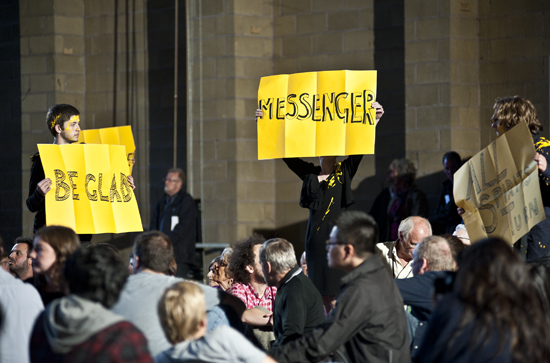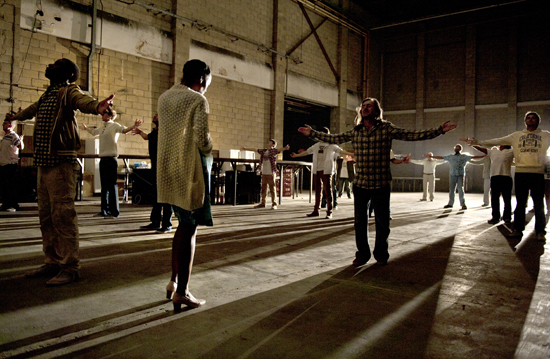Last week, in the decidedly uncosmic surroundings of an abandoned warehouse in Birmingham, a musical convention of galactic proportions took place. Described as "the most ambitious opera ever written", Karlheinz Stockhausen penned Mittwoch aus Licht in 1995-97, but such is the scale and complexity of the piece that it has taken till now for it to be staged in its complete form.
Utilising the resources of two cavernous spaces, two immense sound systems, over a hundred musicians, actors, dancers, four helicopters, video projections and even some live camels, it lasts for six hours, has cost around a million pounds to mount, and taken months of rehearsals. All credit to the Birmingham Opera Company for realising it in such a way that it felt entirely worthwhile.
Stockhausen, who died in 2007, continues to have a curiously double-edged reputation. Throughout the second half of the 20th century, his uncompromising vision of music had a direct influence on everyone from Kraftwerk and Can to Miles Davis, invigorating electronic music, experimental classical music and the outer reaches of jazz alike, winning some hardcore, devoted fans of the sort who will happily make a pilgrimage across the world to Birmingham. More than a handful have bought a ticket for every performance of Mittwoch.
At the same time, he retains a bogeyman quality, a reputation as someone increasingly out of touch with reality, both intellectually and spiritually. He shares with John Cage the fate of being a composer who is more often talked about than listened to, more often written about than performed.
Exhibit A for the Stockhausen detractors is Licht ("Light"), a cycle of seven operas, one for each day of the week, which occupied the composer from 1977 to 2003. Besides the enormous, hyper-Wagnerian scale of the work (it comprises about 30 hours of music), its grandness lies in Stockhausen’s attempt to unite his own brand of mystical cosmology with an epic origin of mankind story. The complex narrative, such as it is, plays out over sequences of vivid, slow-moving tableaux loaded with symbolism, interlaced with occasional moments of seemingly gauche pantomime. Each opera is assigned not only a theme, but also an associated colour, emblematic animal, sense, scent, precious stone and so on, suggesting something on the sliding scale between invented religion and hippyish self-indulgence. The three principal named characters, Michael, Eve and Lucifer, are cyphers, often appearing in simultaneous, multiple forms, as singer, instrumentalist and dancer. It’s unique, but gargantuan, inevitably idiosyncratic and confusing.
Stockhausen’s demands for extremely complicated staging mean that few of the Licht operas are viable for performance in actual opera houses. Samstag (‘Saturday’ 1981-83) for example, was premiered in a sports stadium, in order to successfully contain its demand for a stilt-walking Satan, vertically-arranged orchestra and its ceremonial finale, a kind of ‘black mass’ featuring groups of 13 monks armed with coconuts. Throughout the cycle, the music is unbelievably virtuosic, precisely imagined and choreographed, which led Stockhausen to increasingly limit himself to a small, close group of trusted interpreters, who lived with him in Kürten, West Germany like an extended musical family. The end result of all this ambition is a lingering characterisation of the composer as a bonkers, slightly megalomaniacal space cadet, on a trip irrelevant to the rest of the human race.
In his staging of Mittwoch (‘Wednesday’), director Graham Vick (together with long-term Stockhasuen collaborator and expert Kathinka Pasveer as musical director) has done an outstanding job of cutting through Stockhausen’s esoteric grandiosity to reveal a beating heart of humanity underneath. Despite the explosive difficulty of the music and million pound costs involved in producing this work, the whole enterprise has a feeling of being ‘human scale’. Throughout, there is an atmosphere of genuine, rewarding human collaboration.
"Collaboration" is indeed the theme of Mittwoch, or more precisely "love – friendship – cosmic solidarity", coming as it does after Dienstag (‘Tuesday’), Stockhausen’s stylised "day of conflict". It’s a canny choice, to put on an opera concerning intergalactic friendship in 2012, with the warm glow of Olympic success snuggling us across the land and the enjoyably rich taste of theatrical extravaganza still in our mouths, courtesy of Danny Boyle. While the theme may well have helped attract some of the necessary funding, it does have a seriously relevant spirit. It is the ‘real deal’.
Right at the beginning of the work, the audience is ushered into the huge industrial space to find the fourth wall already broken and the mysticism punctured by the presence of the cast applying their make up in full view, before being seated on the kind of foldable chairs ideal for picnic use. Mittwoch opens with the purely electronic Mittwochs-Gruß (‘Greeting’), which swirls in the darkness via the ‘octaphonic’ sound system which features throughout the Licht cycle. The sounds, based almost entirely on slowly unfolding drones has a curious familiarity, due to Stockhausen’s use of digital synthesisers – a surprise to those familiar only with his early, painstakingly edited musique concréte tape pieces, as exemplified by Gesang der Jünglinge (1955-56). The unearthly hum and fizz of DX7-type instruments revolving in the air is both sinister and sensuous, like the silky descent of an extraterrestrial craft. Throughout the scene, spotlights briefly illuminate a series of fleeting images of tension and resolution. A boy races through with a kite, a pair of young men struggle on a platform, a crowd gathers with palms outstretched, before turning their umbrellas to the sky like radio telescopes, beckoning an arrival. These actors, dressed in their ordinary clothes, are local volunteers who have devised the majority of the movement in Mittwoch in collaboration with Vick. Their performance is subtle, powerful and extremely dedicated, suggesting a real sense of people coming together, gathering at the opening of this monumental occasion.
The composer’s voice announces the end of the greeting, and an eery yellow doorway materialises, through which the audience is led to see the first ‘proper’ scene, Welt-Parlament (‘World Parliament’) – an absolutely stunning hour of unaccompanied vocal music, sung with barely believable intensity by the Birmingham choir Ex Cathedra. Surrounding the audience on high yellow chairs, the choir presents itself as a kind of parallel-universe United Nations, each singer’s face painted with their national flag. The subject for debate is the nature of love, which in Stockhausen’s typically fragmentary libretto is expressed via a mangled combination of wordless chatter, vocal clicks and kisses, and some delightfully childlike pronouncements in several languages ("Love is cosmic glue! Love heals this world!"). As the exchanges become ever more animated, the music becomes ever more languorous until, during a shimmering solo, a soprano shrugs off parliamentary decorum and shakes out her hair seductively, whilst a tenor’s trousers fall off on the other side of the room. Eventually, the members of the choir smear their face paint flags in a gesture of solidarity, before joining hands. There’s a joyous chaos and proper celebratory silliness throughout the scene which Stockhausen gets away with because the music is so, so well written. It’s a masterpiece. He even gets away with a particularly daft joke towards the end in which the parliament’s president/conductor has to run out to move his illegally parked car.
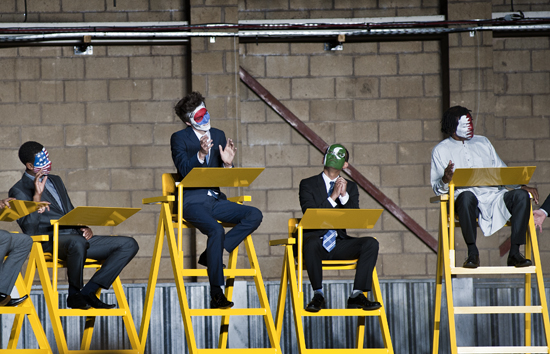
The panto continues with the next scene, Orchester-Finalisten (‘Orchestra Finalists’), which features an ensemble flying on chairs above the audience, each instrument in turn playing a dazzling solo against a constant collage of breezy field recordings and electronic sounds. These showpieces gather in eccentricity, climaxing with a trombone solo delivered prone in a paddling pool and a howling double bass player who eventually collapses from the exertion of playing his unwieldy instrument. Again, Stockhausen’s "unrealisable" stage directions (the oboist is indicated as floating "above a cathedral", the cellist "above an airport by the sea") are interpreted with wit and economy by the actors, who form human backdrops. The quality of the instrumental playing is superhuman, but with the kind of fluency which allows the orchestra to express all the humour of Stockhausen’s score, which pokes gentle fun at the foibles and neuroses of musicians escaped from the pit. The dramatically serious cellist, in his tie-dye rehearsal clothes, and the giggling flautist, who finishes her vertiginous solo with a mumbled "sorry" seem like believable characters. Their collaboration comes at the end of the scene, as everyone reprises their solos together, before a mummy with a gong inexplicably draws things to a close.
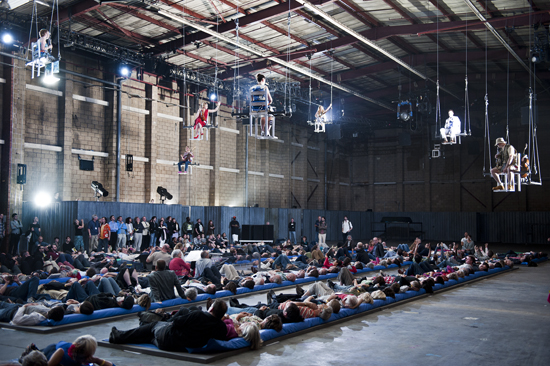
The most notorious section of Mittwoch, possibly the most notorious piece of Stockhausen’s career, comes with the Helikopter-Streichquartett (‘Helicopter String Quartet’), which does much what it says on the tin, sending four musicians wheeling across the city skyline, each in their own helicopter. As a theatrical spectacle, it’s a potentially disruptive moment in the opera, but Vick’s staging contextualises it superbly, so it reads as another symbol of human alliance and cooperation. Video images of the four players are beamed back to the performance space, together with the projected sounds of their instruments blended with the sounds of the rotor blades. Since the quartet are coordinated by click tracks, Stockhausen is able to deploy some ‘magic moments’ in the buzzing musical continuum, as the players call out to one another, or suddenly shift into gear together. It’s unexpectedly moving, like witnessing the last four members of some technologically advanced species operate telepathically whilst miles apart. The Elysian String Quartet play it with the kind of energy and facility which is testament to their brilliance and their unstinting hard work on this piece. Their playing transcends any idea that this might be an expensive gimmick. And they seem only mildly fazed by hurtling around above Birmingham.
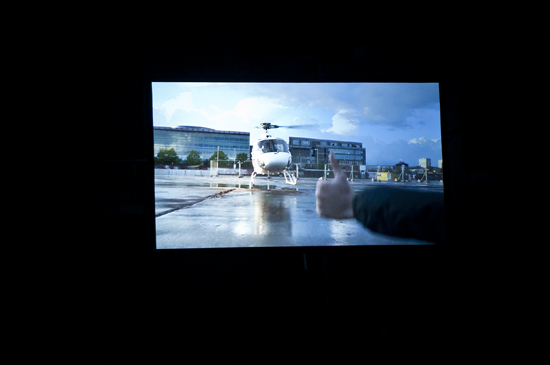
Stockhausen’s vaudevillian impulses surface again during this piece in the guise of the ‘moderator’, a part he intended for himself. This role is that of compere and interviewer, leading a Q&A session with the players and pilots after they return to earth. In the evening’s sole example of ‘interesting’ casting, this part has been given to Nihal, of BBC Radio One fame, who seems properly bemused and amused not only by the oddness of events, but by his own inclusion. His ad-libbed jokes and chumminess might, in ever so slightly different circumstances, have been a touch cringeworthy (even without him accidentally bashing the Elysian Quartet’s Jennymay Logan in the face with the microphone). However, in the context of Vick’s humanised staging, Nihal is alright. His totally-normal-chap presence is acceptably appropriate, as a metaphorical grounding for an event otherwise out of the realms of anyone’s imagination.
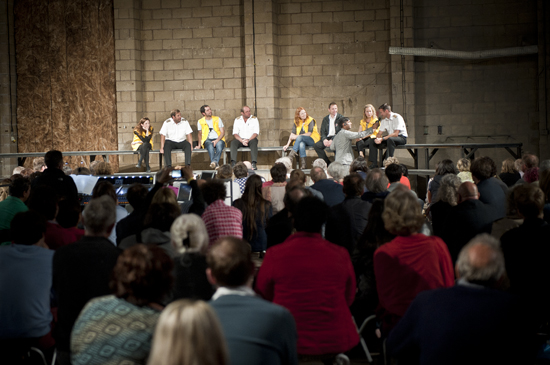
The final scene, Michaelion, is the densest, darkest part of Mittwoch, both musically and dramatically. It is the only part of the work which is remotely ‘operatic’ in construction, with solo vocalists and front-on staging (everything else in the piece is presented in immersive surround sound and surround vision), but to call it ‘conventional’ would be a stretch. Michaelion expands on the idea of Welt-Parlament, presenting a "sacred futuristic meeting point of delegates from different galaxies". The extraordinarily intricate music, with ravishingly sung vocal parts, a glittering trombone solo and another floating electronic environment is too much to absorb in one hearing. The action is dominated by one last piece of Stockhausen comedy, this time some Python-level absurdity: a singing, dancing camel is elected president of the galaxy, before having its hooves shined, shitting out a coloured sphere for each day of the week and being tempted off stage with a blow-up bottle of champagne, of the kind available in Blackpool gift-shops. The camel eventually transforms into the ‘Operator’, a kind of babbling interpreter of this dizzying musical tower of Babel, armed with a shortwave radio receiver in a tidy reminder of Stockhausen’s fascinating experiments with random radio signals in pre-Licht pieces such as Kurzwellen (1968).
Intriguingly, ambiguously, Michaelion ends not with a group-hug climax and curtain-call, but with the operator alone on a wire, disappearing into the glare of a blinding white light. There is a long, astonished pause before anyone applauds, and as they do, the actors wind their way through the crowd, beaming and bearing hand-written messages of inspiration and positivity – "Be Glad", "Gratitude", "Singing". It sounds mawkish in description, embarrassing even, but in practise it radiates an aura of something rather beautiful, after this epic musical experience. The cast and crew mingle and chat with the audience and there is tremendous warmth, even in this chilly concrete hall.
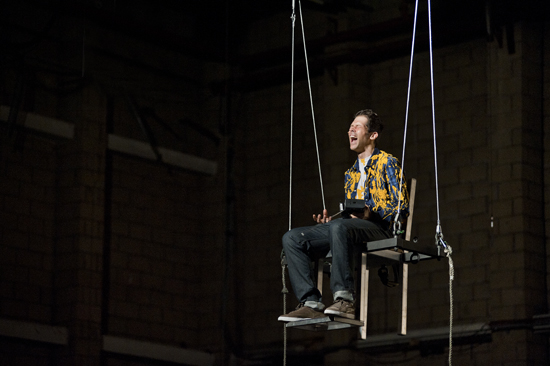
Not only has everyone involved in this piece staged the unstageable, they’ve done it with generosity, understatement and humility. I don’t imagine anyone who saw this event will forget it anytime soon. More than that, it would be nice to think that this project goes someway to dispelling the idea of Stockhausen as a formidably unapproachable and ridiculous figure. In more than 30 years this is only the second part of Licht to be staged in the UK. May it be an inspiration for a rehabilitation, for more soon, please. Or, at the very least, may it be an inspiration for everyone to start listening to the work of a master with fresh ears.
